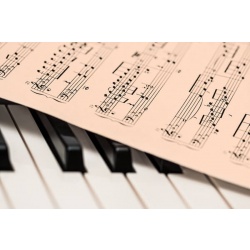
Music Students During COVID: "Nothing is the same anymore -- and I don't think it ever will be the same"
In March, schools around the country began to shut down due to the spread of COVID-19. By mid-April, Governor Reynolds declared that Iowa schools would remain closed through the end of the school year. Curriculums were moved online, and virtual classes commenced...but to what extent?
The transition was tumultuous for students everywhere, but for many Luther College and Decorah Community School District music students, moving online meant losing essential parts of their education.
Ensembles, including band, choir, and orchestra, are staples of the music curriculum. Luther College music education major Madi Miller sang in Nordic Choir during the spring. After moving to online learning, she says, "There wasn't a way for us to rehearse together, so we didn't rehearse at all." Instead, they had weekly online meetings to catch up and socialize.
Luther College Symphony Orchestra bassoonist Kirsten Loynachan adds, "For me, an ensemble experience, especially at the college level, is one of the most valuable musical experiences you can have. You can learn music theory alone and practice your instrument in a practice room alone, but there is nothing that can replicate a live ensemble experience."
Decorah Community School District students were also affected. Band student and soon-to-be Decorah High School (DHS) senior Sarah Pedlar comments, "I found the transition to taking music classes online to be a lot more frustrating and difficult than it was in the case of my non-music classes. Because music ensembles require listening, playing, and live communication (most of which were lost in online learning) in order to foster a strong learning environment, [I] had to come up with new ways to develop musical skills without those things."
On the other hand, non-performance-oriented music classes such as music theory and ear training were much easier to adapt to an online curriculum. Lecture videos were posted online, ear training assignments were recorded and sent in, and collaborative composition projects were hashed out over Zoom.
Those areas of education, coincidentally, were what students felt were lacking from their ensemble classes -- especially at the high school level where music theory and ear training aren't required. DHS band student and 2020 graduate Landon Miller says that since music theory helps musicians understand how they fit into an ensemble while playing a piece, the lull in playing opportunities after moving online would've been a convenient time to teach students basic music theory.
Pedlar agrees that it's important to "take the opportunity of including more music theory and critical listening assignments into the curriculum, as those things are more easily taught online than ensemble performance. They are important parts of music education that I think we often miss out on in ensemble classes."
While there were many setbacks when adapting to online learning, some classes, such as Luther College's conducting class, found ways to improve during the upheaval. Originally, conducting was taught as a masterclass. One student at a time would get up in front of their peers and receive instruction from the professor while the others learned by observing the lesson. When the course went online, the professor met with students once a week to do one-on-one online lessons.
While some institutions may have missed the mark when moving online in the spring, many are stepping up this fall. Former Decorah graduate Jonathon Winter is currently pursuing a Postgraduate Certificate in Violin at Lynn Conservatory and is pleased with how they are handling the fall semester. "We have three options: stay remote, be in-person, or defer for a year." He is choosing to stay remote, and his classes will include online violin lessons, Zoom studio class, recorded "mock auditions," and a Zoom performance class that will broadcast pre-recorded performances.
His ensembles, including orchestra and chamber groups, will focus more on research rather than playing. "We will have full-orchestra Zoom lectures about the Beethoven symphonies...We have yet to hear what our chamber music expectations will be, but it will likely be research and writing assignments."
The conservatory's orchestra will be offering playing opportunities as well. Every other week, orchestra members will record and submit portions of orchestral pieces that were on the program for this upcoming year, and they will receive feedback on their submissions from the conductor.
Conversely, Luther College's fall semester approach is geared more toward being in-person or hybrid rather than fully online. Luther Professor of Music Dr. Juan Tony Guzmán says since different instruments produce different levels of droplets, music lessons may be either online or in-person. The college is additionally considering assigning practice rooms to students and disinfecting each room after every use. In general, music department courses will follow the guidelines determined by the Registrar and Facilities Services to allow for physical distancing, likely resulting in a reduced number of students per classroom.
Site designed and maintained by Iroc Web Design Services©.
Your Small Business Web Design Solutions.™


